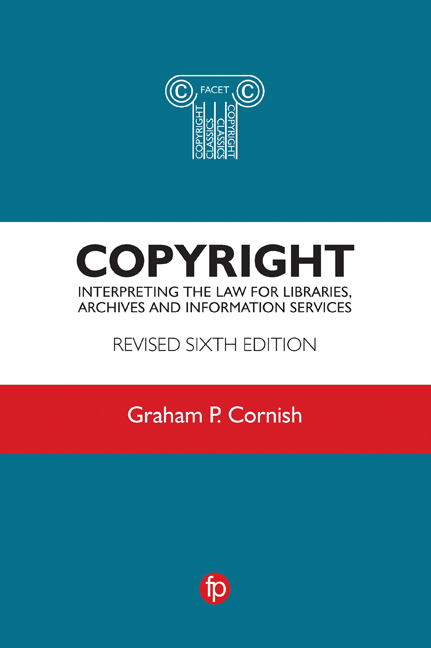Book contents
- Frontmatter
- Contents
- Author's note
- Acknowledgements
- List of abbreviations
- Introduction
- Section 1 Definition and law
- Section 2 What is covered by copyright?
- Section 3 Rights and limitations
- Section 4 Literary, dramatic and musical works
- Section 5 Artistic works
- Section 6 Sound recordings and performers’ rights
- Section 7 Films and videos
- Section 8 Broadcasts
- Section 9 Databases
- Section 10 Licensing schemes and licences
- Section 11 Computer programs, the electronic world and websites
- Section 12 Other matters
- Useful Addresses and Contacts
- Useful Sources of Information
- Appendix: suggested declaration forms
- Index
Section 9 - Databases
Published online by Cambridge University Press: 19 November 2019
- Frontmatter
- Contents
- Author's note
- Acknowledgements
- List of abbreviations
- Introduction
- Section 1 Definition and law
- Section 2 What is covered by copyright?
- Section 3 Rights and limitations
- Section 4 Literary, dramatic and musical works
- Section 5 Artistic works
- Section 6 Sound recordings and performers’ rights
- Section 7 Films and videos
- Section 8 Broadcasts
- Section 9 Databases
- Section 10 Licensing schemes and licences
- Section 11 Computer programs, the electronic world and websites
- Section 12 Other matters
- Useful Addresses and Contacts
- Useful Sources of Information
- Appendix: suggested declaration forms
- Index
Summary
Definition
What is the definition of a database?
A database is defined as: ‘a collection of works, data or other materials which:
• are arranged in a systematic or methodical way, and
• are individually accessible by electronic or other means’.
Are databases protected by copyright?
Databases can certainly be subject to copyright but they are also subject to a quite separate database right.
Can a literary work also be a database?
Yes, it can. In order to be recognised as a literary work, a database will be eligible only if it is original (a vital test for copyright protection) and the selection of the contents and arrangement of the database constitutes the author's own intellectual creation. In this case the database will acquire copyright protection. The courts have also ruled that if a database is the work of an individual but that person was acting under strict instructions then the work does not qualify for copyright, only database right.
Must a database be electronic to be protected?
Definitely not. The phrase ‘other means’ makes that very clear. Databases in paper or audio format, for example, are also protected.
Copyright and database right
Are all databases protected by database right?
All modern ones will be, but some databases which are quite old (established before 1983) qualify only for copyright under the term ‘compilation’ (see Section 4.24 for compilations).
How does something qualify for database right?
To qualify for database right the contents of the database must have been assembled as the result of substantial investment in obtaining, verifying or presenting the contents.
Does investment just mean money?
No. Investment specifically includes financial, human or technical resources.
Does ‘obtain’ mean you must get the data from somewhere else?
Yes, and this is a vital point about databases. It has been ruled that in order to claim database right you must obtain the data. Obtaining means that it already exists. Anyone who creates a database from scratch cannot claim database right, only copyright.
Example: Someone makes a list of retail outlets in a town (see Section 9.29). This forms a database and qualifies because the person making the list obtained the data about the shops. Someone else plans a calendar of events for the village choral society.
- Type
- Chapter
- Information
- CopyrightInterpreting the law for libraries, archives and information services, pp. 135 - 144Publisher: FacetPrint publication year: 2019



